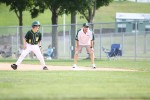I know you come here to read theology, not baseball rules. But I was an umpire for over 20 years, so I’ve got opinions when I see things like what happened last night in the World Series. In the last 12 hours, the call, the rule, and the interpretation has been hashed and rehashed. Fair enough. Here are a couple thoughts from my perspective:
It was obstruction, not interference. That may seem like a technicality, but it’s important in baseball. Interference is when an offensive player interferes with a defensive player.
Example 1: player on second steals third and righthanded batter moves in front of the catcher as he tries to make the throw.
Example 2: runner going from first to second adjusts his route in order to interfere with second baseman attempting to field a ground ball.
You see, in both cases, the interference is deliberate. If the righthanded batter in Example 1 stands still in the batter’s box, it is the catcher’s responsibility to throw around him. If the runner in Example 2 runs straight two second, he does not have to avoid the fielder (however, if he gets hit with the ball before it passes an infielder, he is out).
Obstruction, unlike interference, does not have to be deliberate. The two most common example of obstruction are 1) when a batter swings and hits the catcher’s mitt — this is always obstruction, as long as the batter is in the box; and 2) when a runner rounds first and heads for second and runs into the first baseman. In both cases, it is the defensive player’s responsibility to avoid contact.
That being said, there is inadvertent contact in baseball, as there is in almost any sport. I’ve watched last night’s replay many times, and I think they got the call right, particularly because the MLB rulebook says this:
“After a fielder has made an attempt to field a ball and missed, he can no longer be in the act of fielding the ball. For example: If an infielder dives at a ground ball and the ball passes him and he continues to lie on the ground and delays the progress of the runner, he very likely has obstructed the runner.”
However, they didn’t get it completely right. Among the the mistakes they made was not immediately throwing their hands up and calling “Time.” Both umps — third base and home plate — pointed at the collision, but they allowed the play to continue. That’s not what you do in obstruction. Like a balk, you immediately call “Time,” stop the play, and advance the runners one base.
Baseball fans, your thoughts?















